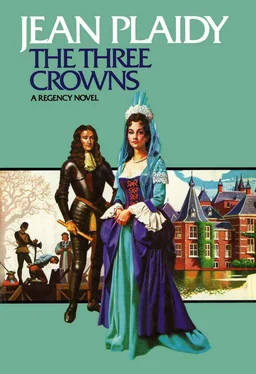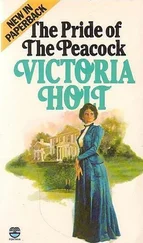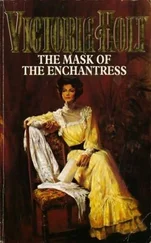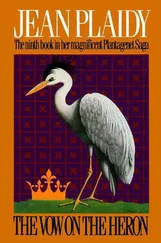She had to take a Crown which, in truth, was her father’s; it was only because it had been forcibly taken from him that it was hers.
What would she find in England? How would the people receive an ungrateful daughter?
I shall be with William again, she told herself. What greater joy could there be for me than that?
No sooner had she stepped aboard than a storm arose and it was necessary to stay in the Maas for the rest of the day; but at last they set sail and she stood on deck watching for the first glimpse of her native land.
With what emotion she saw those cliffs; she tried to tell herself that this was the utmost joy.
Then she was aware of Elizabeth Villiers; her eyes were fixed on the approaching land with a smile as though she too were asking herself what the new life would bring, and she was confident of her future.
Mary dressed with care, for the first meeting with William. She wore a purple gown with a low bodice about which muslin was draped; her petticoat was orange velvet; there were pearls at her throat and her dark hair was piled high above her head and its darkness accentuated by the orange ribbons she wore.
She was pleased with her appearance. She looked like a Queen returning to her Kingdom. There was no hint of sadness. There must not be, for that was something which would displease William.
They were sailing up the once familiar river and there was the great city spread out before them. At Whitehall stairs William would be waiting to greet her.
There was music coming from the banks, but she kept hearing the words of a lampoon which had reached her even in Holland and she asked herself how many of those people who had clustered on the banks to watch her arrival were singing it now.
Yet worse than cruel scornful Goneril, thou;
She took but what her monarch did allow
But thou, most impious, robbest thy father’s brow.
“Father,” she murmured, “it had to be. It was for William. You are to blame … you only. It need never have been. But now it is and I fear that even if William loves me as he seemed to promise—for have I not brought him what he most desired—I shall never forget what we have done to you.”
Away melancholy thoughts!
How gay was the scene—the air bright with frost and gay with music. Cheers for the Queen who had come from Holland to rule them!
The new King was a mean-looking fellow—stooping, hooked-nosed, and small; he gave no sign of pleasure in his people; he did not care for shows and pomp; he had ridden into London for the first time in a closed carriage because it was raining. Not the man the English would have chosen for their King.
But here was the Queen—buxom and beautiful, smiling and seeming gay, orange ribbons shining in her coiled dark hair.
William had stepped forward to greet her. For the second time she saw the tears in his eyes. He embraced her, and the people looked on.
She thought: For William’s sake, everything is worthwhile.
So amid the cheers and the music they left Whitehall stairs—Mary and William, and somewhere in the company, Elizabeth Villiers.
They had seen each other, Elizabeth and William; they had exchanged a glance, and Elizabeth was satisfied.
Mary was not thinking of Elizabeth as she went ashore. She was reunited with William. They were together until death parted them.
A great task confronted them which would draw them closer together.
She would cease to listen to refrains about ungrateful daughters; she would not concern herself with the presence of Elizabeth Villiers.
The bells were ringing out. The people were shouting: “Long live William and Mary.”
A new reign had begun.
Aubrey, William Hickman Smith History of England
Bathurst, Lt.-Col. The Hon. Benjamin Letters of Two Queens
Bray, William, ed. Diary of John Evelyn
Bryant, Arthur King Charles II
Burnet, Bishop History of His Own Time, with notes by the Earls of Dartmouth and Hardwicke and Speaker Onslow, to which are added the cursory remarks of Swift Chapman, Hester W. Mary II, Queen of England
Dasent, Arthur Irwin The Private Life of Charles II
Loth, David Royal Charles: Ruler and Rake
Oman, Carola Mary of Modena
Pepys, Samuel Diary and Correspondence edited by Henry B. Wheatley
Sandars, Mary F. Princess and Queen of England: Life of Mary II
Sells, A. Lytton The Memoirs of James II (translated from the Bouillon manuscript, edited and collated with the Clarke Edition, with an introduction by Sir Arthur Bryant)
Senior, Dorothy The Gay King
Stephen, Sir Leslie, and Sir Sidney Lee, eds. The Dictionary of National Biography
Strickland, Agnes Lives of the Queens of England
Trevelyan, G. M. England Under the Stuarts
Trevelyan, G. M. English Social History
Trevelyan, G. M. History of England
Wade, John British History
Macauley, Lord, edited by Lady Trevelyan The History of England from the Accession of James II








